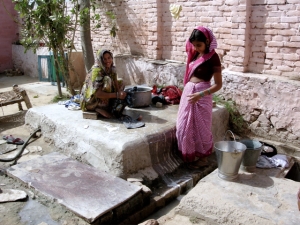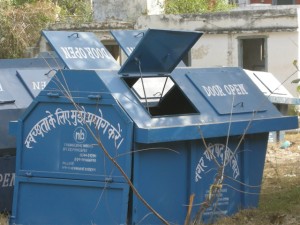At first glance, Narnaul in Haryana appears the typical one-street North Indian small town. The main road running through the town has all manner of shops and eating establishments, a couple of run-down hotels and traffic that seems to be perpetually passing through the town either on its way to Delhi or to some place in nearby Rajasthan. It is one of the rare small towns with a traffic signal, one that seems to exacerbate the traffic problem instead of helping it.
Moghul history
On closer study, you realise that the town has a history dating back to the Moghul era, as is evident from some of the relics, sadly neglected, on its outskirts and located within the town. Bang in the middle of a neighbourhood is the mausoleum of Shah Ibrahim Khan, built by his grandson Sher Shah Suri in AD 1581. The sandstone building has a beautiful painted ceiling in one of its domes and intricate jali work of the kind you find in other moghul monuments.
Yet barring a blue-coloured board put up by the Archaeological Society of India (ASI) that gives some perfunctory details about its history and the fact that it has been declared a monument of national importance on March 6 1983, there is little to protect the place from vandals or just children being playful.
 Photo: The mausoleum of Shah Ibrahim Khan, built by his grandson Sher Shah Suri in AD 1581.
Photo: The mausoleum of Shah Ibrahim Khan, built by his grandson Sher Shah Suri in AD 1581.
A little outside Narnaul is another striking structure from the Moghul Era. Shah Quli Khan built the Jal Mahal in AD 1590-91 when he was the Governor of Narnaul in the reign of Emperor Akbar (1556-1605). The structure was in the centre of a tank. There is no water in the Jal Mahal now. Children play cricket in the dried tank while other kids scramble up and down its walls. Little of the original remains except for one ceiling which even the enterprising have not been able to reach and destroy.
This too has been declared a monument of national importance, on April 7 1981, but no effort has been made to restore it, or even to maintain it. It would be so simple to have a garden around it and make it an attractive spot for families from Narnaul and around to come to during weekend. A nominal charge would help pay for maintenance. But as with so many similar historical structures, the ones in Narnaul typify the cavalier attitude we have towards our history in India.
A future determined by women
The mausoleum and the Jal Mahal are part of Narnaul's past. But what of its present and its future? There is no question that the women of this small town will determine its future.
Nai Basti is an old settlement with about 750 households. It has an active and articulate women's group led by Birna Devi, a former municipal councilor. Another notable woman is Sharda Devi. In a state, where the ratio of boys to girls is shockingly low, the women of Nai Basti are fighting to change attitudes. "If girls are not there, how will the family run? Now we celebrate when girls are born", says Sharda Devi. Although Narnaul town has about 15 ultrasound machines, the women say that these are not used for sex selection. "We get ultrasound done only if there's a problem", says one of the women. Narnaul also has an impressively high literacy rate of over 75 per cent.
The militancy of the women's group in Nai Basti has been apparent in many of the actions they have taken. "We did a lot of dharnas for water two years ago. We jammed the road, went to the District Collector, sat there for three hours. Everyone came. The water came for two days and then stopped. It is the first time I heard the voices of women drown out those of men!" says Sharda Devi. "This is a backward area, yet it is most organised," she adds.
Water continues to be a problem. Although the municipality claims they send tankers to fill up storage tanks in the area, the women say that the water is simply not adequate for so many households. They have pipes that were laid for water to reach each household. Today these pipes are tap-less stumps sticking out of the ground with not a drop of water in sight. Instead, households have built underground sumps where they fill the water they collect from the storage tank or from a hand pump. They have learnt how to conserve each drop of water. "We reuse all the water. What we use to wash clothes is then used again to clean the drains outside our houses", says one of the women.

Water continues to be a problem. Although the municipality claims they send tankers to fill up storage tanks in the area, the women say that the water is simply not adequate for so many households.

Their major concern remains cleanliness. "We must have cleanliness otherwise we will all fall ill", says one of the women. These women have formed mohalla samitis and monitor the municipal workers who are supposed to clean the area. They complain that the karamchari comes only once in 15 days. The contract for keeping the town clean has been partly handed over to a private contractor. But the women say that he employs far fewer people than he is paid for. As a result, the place is not cleaned. The Nai Basti women filed an application under the Right To Information Act to find out how much the contractor was being paid for his work but they did not succeed in getting the information.
Their main grouse, though, is the fact that the sewer lines have not been extended to their area. So even if they use their scarce water resources to flush the drains, the water has nowhere to go.
The Nai Basti situation illustrates well the positive outcome of organising the women in such communities. They have gone beyond their immediate concern for keeping their area clean and fighting for water to take up other issues, including literacy and the attitude towards the girl child. The tragedy however is the iniquitous way in which resources are distributed within towns. While a good section of Narnaul is connected to the sewer system, Nai Basti remains outside it. Similarly, while the better off areas appear to be getting enough water through the tankers, the Nai Basti clearly does not get enough to meet the needs of all its residents.
Several women councilors in Narnaul are active in civic affairs. Laxmi Devi is the councilor for Ward 17. A graduate from Sikar, she says she has been interested in politics since her student days. Her locality, a middle class neighbourhood, has no shortage of water, she says because she has ensured that water reaches it through two water pipes. In addition, she has ensured that there are four sewer lines and has built 18 roads and lanes within her ward. "The problem with the sewers is that they can't cope with the quantity of waste", she points out.
She says that councilors can do a lot, but the problem is that they have a lot of responsibility but no power. "MLA/MPs sit in Chandigarh but people's problems come to us", she says. She adds that ultimately only what the Chairman of the Municipal Council wants is implemented. "Councilors have no influence. Our only work is to plot how to remove this Chairman", she says.
Laxmi is typical of a new generation of educated young women who are now entering the field. She is enthusiastic about politics, wants to go further in it, loves her work and has the full support of her husband.
Gap between intent and performance
In contrast, Rajeshwari Nora is neither so well educated nor informed about her responsibilities. A trained beautician, she is one of three nominated members of the Municipal Council. Her main occupation is managing and running her beauty parlour, one of more than 20 in this small town.
Rajeshwari says that she has understood her rights and her duties. But she acknowledges that she knows little about finance and that there is not much discussion on the budget in the Municipal Council. Similarly, although a District Planning Committee has been formed, it has had only one meeting. Like Laxmi, she says most councilors are busy figuring out how to unseat the current Chairman of the Council.
Many people point out the absence of an Executive Officer. In his place, the Secretary of the Nagar Palika, T R Sharma has to manage. While going over the figures of the budget and the revenue that the town manages to generate, Sharma acknowledges that they succeed in collecting only around 30 per cent of the taxes. Most of this money goes towards paying salaries for workers in the solid waste management, water departments and road maintenance.
Outside his office there are a dozen or so bright blueish-green dustbins that have been newly ordered. He says that sites have been identified where these will be kept but admits that people throw rubbish all around the dustbins. "Our priority is to keep the city clean", he says. For this, two thirds of the wards have been handed over to a private company. There are 90 permanent safai karamacharis and the rest are hired by the private companies who are not paid until the councilor of the particular ward certifies that the job has been done.
 Photo: Brand new dusbins from the municipality - waiting to be misused?
Photo: Brand new dusbins from the municipality - waiting to be misused?
This is the system on paper. But clearly, there is a gap between intent and performance, as the women of Nai Basti emphasised. Unless someone keeps a check, there is nothing that will guarantee that the workers of the private contractor will be any more efficient than the workers hired by the municipality.
Narnaul illustrates above all the value of investing in women. The women of Nai Basti have continued to be active and involved even though they have little support from the Municipal Council.
However, Narnaul also emphasises the need for planning that ensures equitable distribution of resources like water and sewerage. People's enthusiasm for cleanliness cannot be sustained if there is no matching assistance from those in charge of the distribution of these common resources. The poor are often left with no option but to protest and demonstrate and hope that someone will hear their voices.























